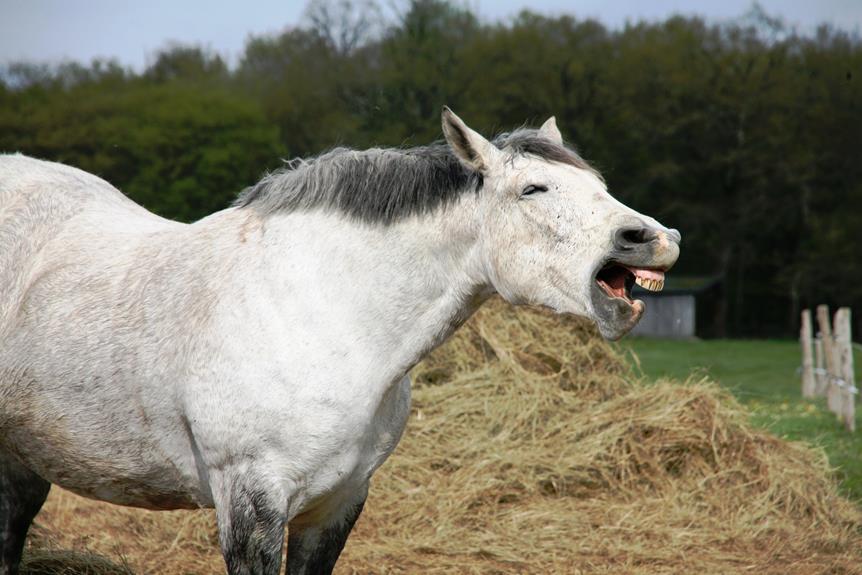Imagine your horse as a majestic tree, standing tall and strong in a lush pasture. Just as the tree thrives on nourishment from the soil, your horse also needs a balanced diet to flourish.
When it comes to adding variety to their meals, have you ever wondered if horses can eat pears? Well, the answer might surprise you.
While horses can indeed enjoy the sweet taste of pears, there are a few things you need to know to ensure their safety and well-being.
So, let's peel back the layers and explore the world of pears for horses.
Key Takeaways
- Pears are safe for horses to eat and can be a healthy addition to their diet.
- Pears are rich in fiber, vitamins, and minerals, promoting healthy digestion and nutrient absorption.
- Feeding pears in moderation is important to prevent overconsumption of sugar and maintain a balanced diet.
- It is crucial to remove pear seeds, cores, and leaves to prevent choking hazards and toxicity.
Nutritional Content of Pears
Pears are packed with essential nutrients that can greatly benefit your horse's overall health and well-being. These juicy fruits are safe for horses to eat and can be a healthy addition to their diet. When feeding pears to your horse, it's important to treat them as a small treat rather than a main meal.
Pears are rich in fiber, which aids in your horse's digestive system. This fiber helps to regulate bowel movements and promotes proper absorption of nutrients. Along with fiber, pears are abundant in vitamins and minerals such as calcium, magnesium, potassium, and Vitamin C. These nutrients contribute to your horse's overall health and play a vital role in their well-being.
To ensure safe consumption, it's recommended to cut the pears into small, edible chunks. This makes it easier for your horse to chew and digest. Additionally, offering ripe pears is preferable as they're softer and more palatable.
It is important to note that while pears can be a healthy addition to your horse's diet, moderation is key. Feeding large quantities of pears or any other treats can disrupt the balance of their diet and lead to weight gain or digestive issues. Furthermore, be cautious and avoid feeding your horse any pears that are spoiled or moldy as they can be toxic.
Health Benefits of Feeding Your Horse Pears
Feeding your horse pears can provide a range of health benefits that contribute to their overall well-being. Pears are a nutritious fruit that can be safely incorporated into a horse's diet. They are easy for horses to digest and can be a healthy and safe treat option.
One of the main benefits of feeding pears to horses is their high fiber content. Fiber promotes healthy digestion and can help prevent digestive issues such as colic. Additionally, the vitamins and minerals found in pears support optimal nutrient absorption, ensuring that your horse receives the necessary nutrients for good health.
The high water content in pears can also benefit horses by keeping them hydrated. Hydration is essential for overall health and can help prevent issues like dehydration and heat stress. Furthermore, pears contain antioxidants that provide anti-inflammatory benefits, supporting the horse's immune system and contributing to their overall wellness.
To emphasize the importance of feeding pears to horses, here is a table summarizing the health benefits they offer:
| Health Benefits of Feeding Pears to Horses | ||
|---|---|---|
| Promotes healthy digestion | Supports hydration | Provides anti-inflammatory benefits |
| Rich in fiber, vitamins, and minerals | Helps prevent digestive issues | Supports heart health |
Remember to offer pears in moderation to prevent overconsumption of sugar, especially for horses with specific health conditions. It's always important to consult with a veterinarian before making any significant changes to your horse's diet.
How to Incorporate Pears Into Your Horse's Diet Safely
To safely incorporate pears into your horse's diet, it's important to prepare them into small, edible chunks or offer ripe pears that are easier for your horse to chew. Here are some tips to help you enjoy feeding pears to your horse:
- Make sure to cut the pears into small, manageable pieces that your horse can easily eat. This will reduce the risk of choking and make it more enjoyable for your horse.
- Feed your horse pears in moderation. While horses enjoy eating pears, it's important to avoid overfeeding pear treats due to their high sugar content. A good guideline is to feed up to two pounds of pears twice a week or offer a chopped medium-sized pear as a treat daily.
- Remove pear seeds, cores, and leaves before feeding. These parts of the pear can pose choking hazards and contain cyanide, which is toxic to horses.
- Horse-safe alternatives to pears include apples, oranges, bananas, grapes, mangoes, celery, pumpkin, strawberries, raisins, and melons. These fruits can also be cut into small pieces and offered as treats to your horse.
Types of Pears That Are Unsafe for Horses
It is important to be aware of the types of pears that can be unsafe for horses. While pears can be a delicious and nutritious treat for horses, there are certain varieties and parts of the pear that should be avoided to ensure your horse's safety and well-being.
When feeding pears to your horse, it is crucial to remove the pear cores. Pear cores can pose a choking hazard and may get stuck in your horse's stomach, leading to potential digestive issues such as colic. Additionally, avoid feeding pears with seeds as they contain small amounts of natural cyanide, which can be harmful to horses.
To make it easier for you to identify which pears are safe for your horse, refer to the table below:
| Types of Pears Unsafe for Horses |
|---|
| Pears with seeds |
| Pear cores |
| Pear tree leaves |
| Canned pears with additives |
Horse-Safe Alternatives to Pears
When considering alternative options to pears for horses, there are a variety of safe and nutritious fruits that can be incorporated into their diet. Here are some horse-safe alternatives to pears:
- Apples: Horses enjoy the sweet taste of apples, and they're an excellent source of vitamins and minerals. Just be sure to remove the seeds and core before feeding.
- Oranges: Oranges are high in water content and provide a refreshing treat for horses. Peel and separate the segments to make it easier for them to eat.
- Bananas: Horses love the taste of bananas, and they're a great source of potassium. Mash them up or slice them into small pieces for easy consumption.
- Grapes: Horses enjoy the sweetness of grapes, and they're a tasty treat that can be fed in moderation. Make sure to remove any seeds before offering.
- Mangoes: Mangoes are a delicious and nutritious fruit that horses can safely enjoy. Cut them into small, bite-sized pieces for easy eating.
- Celery: Celery is a low-sugar option that can provide a satisfying crunch for horses. Chop it into small pieces and offer as a healthy snack.
- Pumpkin: Horses can safely eat pumpkin, which is rich in fiber and can aid in digestion. Cooked or pureed pumpkin is a tasty treat that horses will enjoy.
- Strawberries: Strawberries are a sweet and juicy treat that horses love. Slice them into small pieces and offer as an occasional reward.
- Raisins: Raisins can be a tasty and nutritious treat for horses when fed in small quantities. Be sure to offer them as a special treat and not as a regular part of their diet.
- Melons: Watermelon, cantaloupe, and honeydew are all safe options that horses can enjoy. Cut them into small, bite-sized pieces for easy consumption.
Frequently Asked Questions
What Fruit Can Horses Not Eat?
Toxic fruits for horses include persimmons, rhubarb, and nightshade family fruits like tomatoes and potatoes. Avoid feeding fruits with choking hazards like nectarines and plums. Citrus fruits, berries, and grapes should also be avoided due to their high sugar content.
What Fruit Is Good for Horses?
Fruit is good for horses as it provides nutritional benefits, adds variety to their diet, and promotes digestive health. Introduce fruit gradually, offer small chunks, and balance it with other food sources. Remember precautions to ensure their well-being.
Why Can't Horses Eat Apples?
Horses can eat apples, but some may have allergies to them. Apples provide nutritional benefits and can be a safe treat when given in moderation. Always consult a vet for dietary advice.
Can Horses Have Pineapple?
Yes, horses can have pineapple as a treat. It provides nutritional benefits, hydration, and potential deworming properties. Be cautious of pineapple allergies and cut it into small pieces to aid digestion and promote dental health.
Conclusion
In conclusion, pears can be a beneficial addition to a horse's diet. They're high in fiber and contain essential vitamins and minerals.
However, it's important to avoid feeding them the seeds, cores, and leaves, and to offer them in moderation due to their high sugar content.
By incorporating pears safely, horse owners can provide their equine companions with improved digestive health and other health benefits.



0 Comments